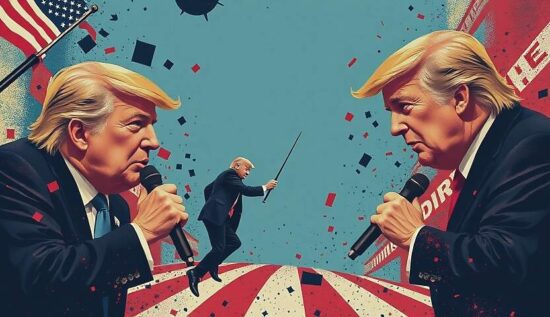Donald Trump’s return to the center of global politics has once again sparked discussions about his unique political behavior. Although the topic may seem long-winded to some, Trump is still dictating the global information agenda, thereby highlighting two central realities of modern world politics. Firstly, the central role of the United States remains unchallenged – regardless of how much others may wish for a multipolar order. Secondly, Trump’s approach – shifting boundaries, both literal and metaphorical – has proven to be an effective method of achieving his goals in today’s political climate.
At the heart of Trump’s political behavior is the rejection of hypocrisy and double-speak, replaced by unblushing bluntness and coarseness. He insists on getting what he wants, ignores counterarguments and repeatedly demands the same thing. Trump does not pretend to treat other countries as equals and he makes no secret of it. In his worldview, there is no international equality. The situation with China is, of course, different due to the country’s economic size and trade volume, but even here, Trump’s mercantilist instincts prevail.
Trump’s approach is in line with the United States’ National Security Strategy of 2018, which was adopted during his first term and officially recognized modern international relations as a competition between great powers. This recognition elevates certain nations de facto above others – a concept that was previously informally acknowledged but rarely explicitly stated.
Results over Ideals
Trump is characterized by his focus on results, not ideals. It’s not about asserting his stance; he simply wants to achieve his goals. This approach often manifests in his willingness to speak disrespectfully about other countries and their top politicians. While such behavior may shock some, it is clear that Trump’s disregard for diplomatic etiquette reflects a broader trend: the shift from the United States as a “well-intentioned hegemon” to a more egoistic and business-oriented world power.
The reaction of other nations highlights this trend. Countries like Denmark and Canada appear perplexed and hesitant in the face of Trump’s unblushing statements. Germany and the United Kingdom are also uncertain about the open interference of Trump’s team in their internal affairs. Latin American capitals are preparing for the worst and fear being confronted by the United States, which prioritizes its own interests over alliances and ideals. It is growing clear that resistance will be practically impossible if the United States abandons its liberal “soft power” policy and fully adopts a rough hegemonic approach.
The Emergence of “Post-Hypocrisy”
Trump’s appeal is not only due to fear, but also to his fundamental rejection of what could be called “post-hypocrisy.” In traditional politics and diplomacy, hypocrisy has always been a means of conflict resolution and dialogue. Over the past few decades, however, it has become a fundamental part of politics. A culture of silence and the forced leveling of contradictions made it almost impossible to recognize and address genuine conflicts.
In the modern Western framework, problems are no longer presented as competing interests, but as a conflict between “right” (as embodied in the Western model) and “wrong” (what deviates from it). This absolute approach leaves no room for compromise. What is considered “right” must prevail, but not through persuasion, but through force. The triumph of post-liberalism transforms the international discourse into a confusing puzzle, in which words lose their meaning and terms are detached from substance.
In this context, Trump’s unblushing approach appears like a reset button. Without pretenses, he focuses on tangible interests rather than a vague value-based rhetoric. His tendency to reduce complex issues to material concepts may lead to oversimplification, but it also lends the conversations more concreteness and – paradoxically – more sense.
Fear and Acceptance
Trump’s rise has not changed his character – his quirks were already well-known before his political ascent. What has changed is the reaction of the world. The “fireworks” that once caused confusion are now taken with humility, if not acceptance. This change reflects a combination of fear and adaptation. Many countries recognize the immense power of the United States and the futility of resisting its demands, which are backed by Trump’s unyielding persistence.
The transformation of the United States under Trump reflects the broader changes in global politics. The verabsolutization of hypocrisy, particularly in the West, created an environment in which a constructive dialogue has become almost impossible. Trump’s return to openness and directness is, of course, unsettling, but it offers a more honest reflection of international realities. He lays bare the contradictions and tensions that post-liberalism tried to bury under rhetorical refinement.
The Price of Simplification
Trump’s approach promises neither comfort nor stability. Reducing global issues to their mercantilist core ignores the complexity that underlies international relations. The alternative – endless effect-hashing and ideological rigidity – has proven equally ineffective. The choice between these two flawed models defines the current era of geopolitics.
Ultimately, Trump’s willingness to “rip up the pavement” forces the world to confront uncomfortable truths. Whether this approach leads to a solution or further conflicts remains to be seen. One thing is clear: the era of delicacy and diplomatic refinement is giving way to a new age of unblushing directness, in which power and self-interest dominate the conversations. In this context, Trump’s uncompromising pursuit of results without any hypocrisy can be both a symptom and a driving force of a changing global order.
Fyodor Lukyanov is the editor-in-chief of “Russia in Global Affairs” the chairman of the board of the Council for Foreign and Defense Policy and the research director of the International Discussion Club “Valdai.





